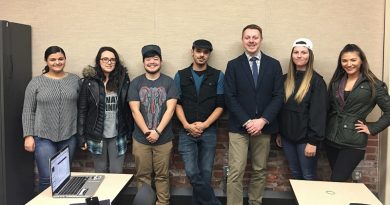The (not-so) Wonder Years
The first of a three-part series on the care — or lack thereof — available for adults with autism
By Julian Estrada
It seems that — cemented permanently between the Space Needle, CenturyLink Field, technological giants like Amazon, Microsoft, Pike Place market, and blue collar sectors — the Pacific Northwest is essentially a medical, research, and philanthropic empire. It looks like addressing autism spectrum disorders (ASD) in children is among the region’s priorities.
But these children eventually become adults. What happens to them in their adult years?
My armchair theory is that everyone and their mom in the Evergreen state appears to be involved in this noble endeavor to understand, treat, and possibly cure ASD — well except for autistic adults and their moms. Because while these efforts are going on, autistic adults are aging out of care systems and left with little to no services.
And causally, caregivers are discarded by proxy, being that they are tied to their caregiving.
I see the discarding first-hand as a part–time caregiver for Matthew Loberg — “Matty,” a 22-year-old autistic adult in rural Olympia, who also suffers from epileptic seizures. On the days when I head down to Lacey to spend time with Matty, my time is divided between combing the internet for resources in Thurston County for him, and wandering with him in libraries, Goodwills, Safeways, drive-thrus, cafes, and parking lots.
It amounts to fake research and awkward loitering.
I’d like to think that taking Matty on scenic drives through Olympia is more about taking in the beautiful architectural and natural scenery of the state capital, especially in Autumn when the leaves are 42 shades of red, and less about the lack of programs or facilities for Matty.
I was compelled to advocate at the request of Matty’s mom, Joan Loberg, who has lifelong exhaustion written all over her eyes. It is a familiar look I have seen in my own mom’s eyes; she is a primary caregiver of Esther, my autistic 18 year old sister, who is also on the cusp of wandering into adulthood.
But I figure that my experiences are microcosms compared to the daily struggles of my mom, let alone Mrs. Loberg — these shadow moms.
Mrs. Loberg’s other son is Anthony, 19. He has Asperger’s, a high–functioning but nonetheless noticeable condition characterized by what us neurotypicals view as peculiar, odd social interactions. It’s easy to see why a caregiver of two special–needs adults doesn’t have the vigor to play phone tag in what seems like an infinity loop of meandering for services.
“Blind side is you don’t realize how tired you are until your temper starts flaring,” Mrs. Loberg added.
Mrs. Loberg, wife of retired navy officer Steven Loberg, was a music teacher until Matty turned 3. Due to the nomadic nature of military life, the Lobergs moved every several years and experienced services for autistic children in several states.
Some seemed wonderful while some left them wondering.
“Virginia was the best state in the nation,” Mrs. Loberg said with earnestness as heavy as her burden.
During these formative years they were also subjects in several genetic studies conducted by the University of Washington, Stanford, and Princeton. The Lobergs paid out–of–pocket to participate in these studies, took their sons to therapy, and continued to receive services.
“Nobody receives a lot of services without making a lot of phone calls,” said Mrs. Loberg.
Nineteen years later, Anthony is aging into adulthood as an autonomous individual. He attends school regularly, arrives home at 2 p.m., and spends his time on the computer or playing video games like any other 20–something college student.
Matty, having received thorough therapy through Applied Behavioral Analysis (ABA) techniques, became relatively docile and compliant.
“The principles of ABA can certainly be used to teach compliance, but they can also be used to teach many other skills,” said Dr. Nicolette Brigham, director of Training and Research at the UW Autism Center.
I am in awe that Matty picks up after himself, compared to my sister Esther. He puts on his seatbelt, and shakes my hand every Friday morning at 9 a.m. when I show up at the Loberg steps. Esther throws away food wrappers at will, and eats indiscriminately off of people’s plates, including mine. And often times she doesn’t want to shake hands.
Matty’s childhood treatment seems to have done wonders.
“It’s a one–on–one treatment focusing on compliance, which was very helpful in Matthews case,” stated Mrs. Loberg.
Matty lost services and structure when he turned 19. He remains stagnant and highly dependent on Mrs. Loberg.
“I have to compensate for the fact that he is so vulnerable,” added Mrs. Loberg, as Matty paces and hums in the kitchen like a lost silhouette.





